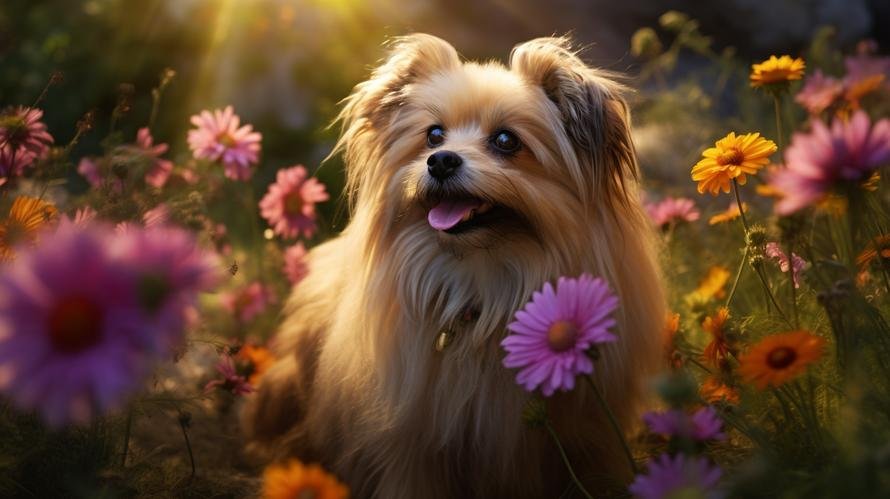Did you know Löwchen means “little lion” in German? This small, yet feisty breed, considered a member of the Bichon family, is known just as much for its courage as for its cute, fluffy mane – hence its nickname. Yet, whilst they may share the heart of a lion, their diet needs can be quite different from their big cat namesake. So, naturally, as a Löwchen parent, you might wonder if your four-legged friend needs a special diet to stay healthy and active. If that’s your case, stay with me, as I will answer this question!
When deciding what to feed your Löwchen, it’s important to consider their unique nutritional needs. Despite their small size, the breed is known for its energy and enthusiasm. This means that they need a diet rich in proteins, carbohydrates, healthy fats, and a diverse array of vitamins and minerals to ensure they maintain their playful demeanour and vibrant health.
First, let’s talk about proteins. Your energetic Löwchen will benefit from a diet that contains between 20-25% of top-quality protein. This protein can come from animal-based sources such as chicken, beef, fish, or lamb. These sources are rich in essential amino acids, which are necessary for the tissue repair, muscle growth, and overall good health of your Löwchen.
Carbohydrates are another important component of your Löwchen’s dietary needs. Be mindful that not all carbs are created equal. Opt for complex carbohydrates like sweet potatoes, brown rice or oats. These provide energy over a longer timeframe, ensuring your vibrant little lion stays energetic for longer. The carbohydrate content of a Löwchen’s diet should account for approximately 50% of their total food intake.
Fats, often misconceived as harmful, also play a vital role in a Löwchen’s diet. Healthy fats like those found in Salmon and other fatty fishes can provide necessary fuel for energy, keep your Löwchen’s skin healthy, and promote a shiny, luxurious coat. Just be cautious about the amount: anywhere between 10-15% of your pet’s diet should be fat.
Let’s not forget about vitamins and minerals. These elements support numerous bodily functions, including skeleton development, nutrient absorption, and immunological responses. Look for dog food that incorporates fruits, vegetables, and supplements to bolster its nutritional profile. But before you go adding supplements to your furry friend’s food, always consult with your veterinarian. Too much of a certain vitamin or mineral can also cause issues.
Now to address the elephant in the room: does Löwchen need special dog food? Well, there isn’t a straightforward yes or no answer. It depends on the individual dog’s environment, lifestyle, health, and specific needs. Generally, a Löwchen does not have much breed-specific nutritional requirements compared to other dogs. Thus, a well-rounded, high-quality diet, whether it’s branded as ‘special’ or not, would suffice for most Löwchens. But, we can all agree that they deserve special treatment!
If your Löwchen has any existing health problems like skin issues, allergies, dental problems, or digestive disorders, you may want to consider special or prescription diets designed to assist with these conditions. An overweight Löwchen may benefit from a weight management diet that is still nutrient-dense but lower in calories. Likewise, elderly Löwchens might need foods formulated with their age in mind.
So, the short answer is, while a special diet isn’t typically necessary for all Löwchens, it might be beneficial, or even necessary, in certain situations. More than the label, it’s the quality and balance of the diet that truly matters! Remember, ever Löwchen is a unique individual and what works for one may not work for another.
Going back to our lion comparison, in the same way a lion’s diet is specialized for its lifestyle, your Löwchen’s diet should reflect its individual needs. Conduct regular check-ups with your vet to ensure that your furball is on track towards a healthy and happy life! After all, aren’t they worth it?
In summary, Löwchens often don’t require a specific type of dog food, but ensuring that you choose a high-quality, nutritious brand is key. Like all breeds, they need protein, carbohydrates, and healthy fats in their diet, along with a range of vitamins and minerals. Consult with your vet regularly and be flexible to change based on individual needs, and your little lion will be prowling healthily, happily, and majestically for many years to come. Remember, in the animal kingdom and in our own homes, diet is a big part of a thriving life!



